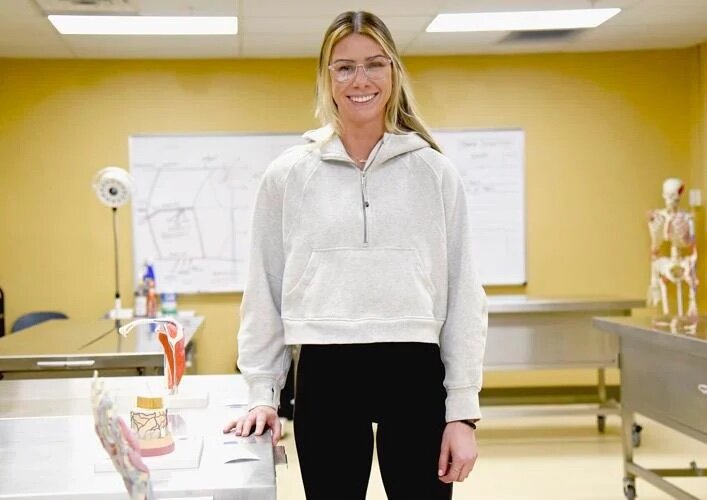At Briar Cliff University, undergraduate and graduate students in prospective fields of study get the unique privilege of working in one of the region’s only educational cadaver labs. A cadaver is a deceased human body donated to scientific research, allowing students to learn and see human anatomy in ways that the textbook cannot show. The Cadaver lab gives an eye-opening, real-life advantage that enhance many health science undergraduate and graduate programs offered here at Briar Cliff.
A large obstacle for new medical students is training in a cadaver lab, therefore, providing this experience before furthering their education gives them a head start. Kelsey Stevens, assistant professor in the physical therapy department at Briar Cliff, says her students who are planning on becoming doctors, physician assistants, occupational therapists, or physical therapists get the opportunity to take what they are learning in the classroom and see it first hand through dissections.
This gives students a “mini med school” experience before transitioning into professional school. Working for the Sanford School of Medicine, Stevens has proudly modeled their program to better prepare students at Briar Cliff for that type of experience.
The experience is like being in graduate school said former student, Sophie Kramper, who majored in exercise physiology.
Former student, Abbie Ericson, who majored in physical therapy said the class has been different from any other. “It’s more hands on and more applied towards graduate programs … It's harder than the other classes I have had, but way more interesting."
While the opportunity to learn with cadavers is unique and rare at the undergraduate level, it is even more uncommon to perform or witness dissections.
At Briar Cliff, the undergraduates help graduate students learn by conducting special dissections throughout the school year to look at clinically relevant parts of the body. Then, Doctor of Physical Therapy and more recently the new Doctor of Occupational Therapy students get to utilize the same donors in the summer. “So, when the DPT's and ODT's come in the summer, they can see pathologies like arthritis or maybe knee surgery,” Stevens said.

To have the opportunity to visit or utilize a cadaver lab, especially at a University that offers smaller student body and smaller class sizes is an incredibly unique experience. Professors are better able to focus on hands-on learning experiences and offer more one-on-one learning tailored to the individual student.
Doctor of Physical Therapy and Doctor of Occupation Therapy students are not alone in using the lab. Briar Cliff is proud to utilize the labs' learning capabilities in all many health science programs.
There are also many opportunities to tour the lab for those who are interested but are not taking the classes. A new anatomy interest group makes it possible for people around campus to be invited to special dissections. During Visit days, prospective high school students and those interested in the Health & Science Undergraduate Programs tour the lab, getting to see first-hand the advantages the Cadaver Lab and other resources Briar Cliff offers.
Video: Casey Zoss on the many science programs & resources here at Briar Cliff University.
A cadaver is more than an important learning tool, the value of the cadaver to education requires a sense of appreciation and respect to the donor. Stevens says Briar Cliff ensures this by doing a donor memorial service once a year at the beginning of the semester. It helps students be intentional about how they pay respect to an individual who donated their body to future healthcare education.
"During this event, our students share reflections on how their education was impacted by the donors and express their gratitude towards the donors and their families," says Candace Chihak, Briar Cliff University's Professor of Nursing. "In addition to written reflections, some of the students will express their gratitude through other means such as poetry and artwork."
Since the 1980's, BCU students have had the incredible opportunity to prepare for the medical field in the Cadaver lab and the programs that are able to learn and experience the lab is only growing. But most importantly, Candace says, "it is amazing to see students who want to help people and change lives."